I intend to start another Bach blog in the next month or so, going through every CD in a different Bach Complete Works set.
I’ll post a link to it here when it’s ready.

I intend to start another Bach blog in the next month or so, going through every CD in a different Bach Complete Works set.
I’ll post a link to it here when it’s ready.
→ 2 CommentsTags:
Thanks to various personal issues (including several deaths in my family) I don’t have time to continue with this project.
I may pick up again next year. Or I may not.
All I know for sure is that I’ve lost too much ground, and I need to turn my attention to screenwriting and other matters.
I’ve had fun, learned a lot, and discovered a lot of new music, as well as new instruments and musicians.
Thank you for following along. I hope to see you again sometime!
→ 3 CommentsTags:
In case you were wondering, that’s why I haven’t been posting regularly.
I’ve been with Bradbury, my cat, for 10 years. He’s the most adorable, sweet-tempered, intelligent and funny feline I’ve ever seen. He’s a Scottish Fold with such sad eyes that he melts hearts in even the most anti-cat people.
My wife and I have been taking care of him, giving him four injections daily, including a sub-cu treatment of Ringers Lactate so that he is hydrated. He won’t eat. So he’s not getting enough fluids. Hence, the Ringers. He’s getting skinny and lethargic. Breathing is difficult for him, too (he has a mass on one of his lungs and spots in another — which likely means cancer). It’s heartbreaking to see him like this, and even more so knowing he won’t be around much longer.
 In the spirit of what I’m doing with this web site, I’ve listened to the Bach CDs every day. But I just haven’t had the 1-2 hours per day to post comments, links, video clips, etc.
In the spirit of what I’m doing with this web site, I’ve listened to the Bach CDs every day. But I just haven’t had the 1-2 hours per day to post comments, links, video clips, etc.
So I figured I’d start back up with today’s current CD and back-fill the other posts as time allows.
Let’s start with a question. What is a toccata?
According to its entry on Wikipedia, a toccata is:
Toccata (from Italian toccare, “to touch”) is a virtuoso piece of music typically for a keyboard or plucked string instrument featuring fast-moving, lightly fingered or otherwise virtuosic passages or sections, with or without imitative or fugal interludes, generally emphasizing the dexterity of the performer’s fingers. Less frequently, the name is applied to works for multiple instruments (the opening of Claudio Monteverdi’s opera Orfeo being a notable example).
I don’t know if it’s my current state of mind, or if I don’t care for these compositions. But I can’t seem to get into them. They sound like someone smacking together a bunch of trash-can lids. It’s not melodic or hook-y enough to grab my attention.
Of course, Bach was a young lad when he [Read more →]
→ No CommentsTags:
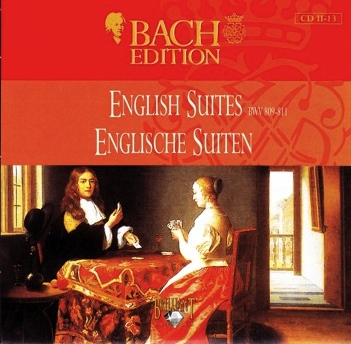 In my previous post, I discovered what is meant by the term “English Suites.” From its entry on Wikipedia:
In my previous post, I discovered what is meant by the term “English Suites.” From its entry on Wikipedia:
These six suites for keyboard are thought to be the earliest set that Bach composed. Originally, their date of composition was thought to have been between 1718 and 1720, but more recent research suggests that the composition was likely earlier, around 1715, while the composer was living in Weimar.
Bach’s English Suites display less affinity with Baroque English keyboard style than the French Suites do to French Baroque keyboard style; the name “English” is thought to date back to a claim made by the nineteenth-century Bach biographer Johann Nikolaus Forkel that these works might have been composed for an English nobleman. No evidence has emerged to substantiate this claim.[citation needed] It has also been suggested that the name is a tribute to Charles Dieupart, whose fame was greatest in England, and on whose Six Suittes de clavessin Bach’s English Suites were in part based.
Surface characteristics of the English Suites strongly resemble those of Bach’s French Suites and Partitas, particularly in the sequential dance-movement structural organization and treatment of ornamentation. These suites also resemble the Baroque French keyboard suite typified by the generation of composers including Jean-Henri d’Anglebert, and the dance-suite tradition of French lutenists that preceded it.
Today’s compositions are once again played on the harpsichord, performed by Bob Van Asperen, a Dutch multi-instrumentalist known primarily for his prowess on the harpsichord. (Makes sense.)
Here’s what I’d love to know: Does a musician’s unique personality make the playing of the harpsichord more interesting and/or listenable to me? Or is it [Read more →]
→ No CommentsTags:
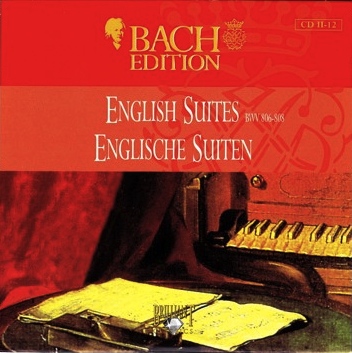 English Suites, eh? What’s an English Suite?
English Suites, eh? What’s an English Suite?
As usual, Wikipedia to the rescue. Here’s the entry for English Suites:
The English Suites, BWV 806–811, are a set of six suites written by the German composer Johann Sebastian Bach for harpsichord and generally thought to be the earliest of Bach’s 19 suites for keyboard, the others being the 6 French Suites, BWV 812-817, the 6 Partitas, BWV 825-830 and the Overture in the French style, BWV 831…
Although today’s compositions are once again played on the harpsichord, they’re performed by a different musician: Bob Van Asperen, a Dutch multi-instrumentalist known primarily for his prowess on the harpsichord. Makes sense.
These are terrific, full of variation and depth, speed and restraint. I could listen to this again, which is admitting a lot since it is music performed on the dreaded h-word instrument.
The compositions on today’s CD are:
BWV 806
BWV 807
BWV 808
All of the above were composed around 1725. Bach was 40.
→ 3 CommentsTags:
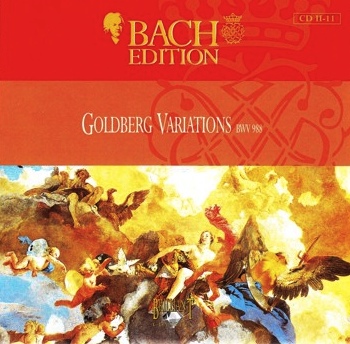 If you’re expecting me to get through today’s listening without mentioning Glenn Gould, you’re going to be sorely disappointed.
If you’re expecting me to get through today’s listening without mentioning Glenn Gould, you’re going to be sorely disappointed.
For today’s Brilliant Classics CD (performed by Pieter-Jan Belder on Flemish harpsichord) is none other than the famous Goldberg Variations, which was Glenn Gould’s first album, recorded in 1955 for Columbia Records.
But that’s another story.
Today’s story begins with the question, “Who was Goldberg?”
For the answer, I’ll turn again to Wikipedia, which — in the very first paragraph — tells me this:
The Goldberg Variations, BWV 988, is a work for harpsichord by Johann Sebastian Bach, consisting of an aria and a set of 30 variations. First published in 1741, the work is considered to be one of the most important examples of variation form. The Variations are named after Johann Gottlieb Goldberg, who may have been the first performer.
So Johann Gottlieb Goldberg may have been the “first performer.” The first performer of [Read more →]
→ No CommentsTags:
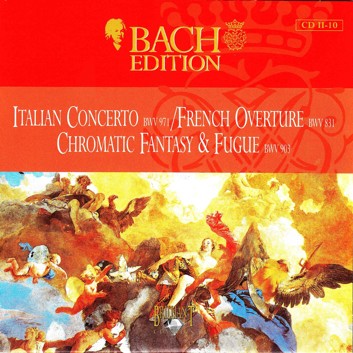 If it’s possible, the first composition on this CD is even more recognized (and loved) than the Brandenburg Concertos. It’s so Bach, so Baroque.
If it’s possible, the first composition on this CD is even more recognized (and loved) than the Brandenburg Concertos. It’s so Bach, so Baroque.
I know. I know. I’m making a big claim. But listen to it and you’ll see what I mean.
I refer, of course, to Italian Concerto in F major (BWV 971), movement one (“Allegro”), which sounds like this:
That piece on YouTube is even played on the harpsichord (which is what I’m listening to this morning — although from a different performer)…
…as opposed to, say, Glenn Gould’s version played on the piano:
Come on now. Admit it. You prefer Gould’s version, don’t you? Yeah. I thought so.
It’s not that Pieter-Jan Belder’s playing of the harpsichord (on today’s Brilliant Classics CD) is bad. It’s actually very good. But (and here it comes again) I prefer the sound of the piano. It’s more expressive than the harpsichord.
But I’ll buck up and keep listening to these Brilliant Classics performances because [Read more →]
→ 3 CommentsTags:
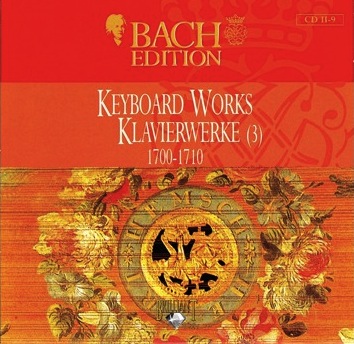 Another CD of very old, miscellaneous Bach compositions (often of dubious origin), once again performed by Christiane Wuyts, a Belgium-born harpsichord known particularly for her performances of Bach’s music, as well as for her use of period instruments. The two harpsichords she’s playing on this CD were made by Henri Hemsch (1754) and Jacques Goermans (1774).
Another CD of very old, miscellaneous Bach compositions (often of dubious origin), once again performed by Christiane Wuyts, a Belgium-born harpsichord known particularly for her performances of Bach’s music, as well as for her use of period instruments. The two harpsichords she’s playing on this CD were made by Henri Hemsch (1754) and Jacques Goermans (1774).
Bach must have had a robust sense of humor. Or maybe it’s harpsichordist Christiane Wuyts pulling a Glenn Gould. But one minute sixteen seconds into a very sleepy BWV 909 (“Concerto E Fuga in C minor”), Wuyts starts banging away on the keyboard with crashing chords and then intersperses the pounding with a flurry of notes starting at the 1:23 mark. It’s like Bach wanted to surprise listeners, given them something completely different. I loved it. In fact, I enjoyed the entire piece of music. There are lots of rapid-fire notes and quirky little passages in this composition. Sadly, one Bach web site indicates BWV 909 is “Authenticity doubtful; not by J.S. Bach.” Figures. One of my favorite Bach pieces to date may not have been written by Bach.
Many of the compositions on today’s CD interested me, mostly because of the speedy at which many of the passages were played. A harpsichord sounds terrific when its player’s fingers are a blur.
Another interesting piece was [Read more →]
→ 9 CommentsTags:
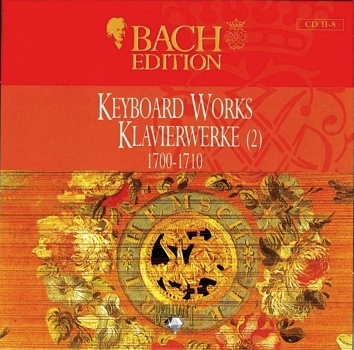 Another CD of very old, miscellaneous Bach compositions, once again performed by Christiane Wuyts, a Belgium-born harpsichord known particularly for her performances of Bach’s music, as well as for her use of period instruments. The two harpsichords she’s playing on this CD were made by Henri Hemsch (1754) and Jacques Goermans (1774).
Another CD of very old, miscellaneous Bach compositions, once again performed by Christiane Wuyts, a Belgium-born harpsichord known particularly for her performances of Bach’s music, as well as for her use of period instruments. The two harpsichords she’s playing on this CD were made by Henri Hemsch (1754) and Jacques Goermans (1774).
BWV 923 (“Praeludium in B minor”) is a corker of a piece of music, with waves of notes coming at the listener like waves against the beach. That’s what this composition sounded like — waves. It must have been a beeyatch to play. (But not nearly so as the last 20 seconds or so of BWV 993 — “Capriccio in E major.” Wow. Metal guitarist Yngwie Malmsteen would love to get his hands on that run of notes.)
This CD is less remarkable than Part One. In fact, these compositions tend to sound like noise — especially BWV 951 (“Fuge in B minor”). It goes on and on and on with nary a distinguishing note to be heard among them.
BWV 822 (“Suite in G minor”) features some interesting sounds, almost like the harpsichordist is muffling the strings while striking (actually, plucking) them. It sounded like muting the strings on a guitar.
We watched a documentary about pianist Glenn Gould today. It was called Genius Within: The Inner Life of Glenn Gould. It was utterly fascinating.
One of the things that caught my attention was when Glenn Gould performed the First Piano Concerto of Johannes Brahms in such a dramatically different way from what Brahms intended that [Read more →]
→ No CommentsTags:
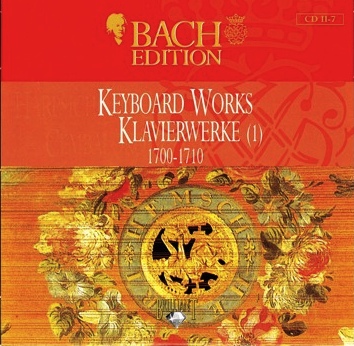 Not that this should matter, but it’s something I noticed about today’s performances: They’re by a woman.
Not that this should matter, but it’s something I noticed about today’s performances: They’re by a woman.
Unless I’m mistaken, this is the first time I’ve heard a woman play harpsichord on a Classical-music CD. Her name is Christiane Wuyts, a Belgium-born harpsichord known particularly for her performances of Bach’s music, as well as for her use of period instruments. The two harpsichords she’s playing on this CD were made by Henri Hemsch (1754) and Jacques Goermans (1774).
Today’s CD, despite it being harpsichord solo music, is quite nice. BWV 922 — Praeludium in A minor — began as a barrage of notes that caught my attention. BWV 954 — Fuga in B flat major — was a pleasant composition. The “fugue” aspect was quite apparent, especially in the beginning. The various voices were clear as a bell, following each other as if up a spiral staircase. It was a great piece of music, well played.
The compositions on today’s CD are:
BWV 965 —
BWV 948 —
BWV 823 —
BWV 922 —
BWV 833 —
BWV 954 —
BWV 917 —
BWV 963 —
BWV 947 —
BWV 958 —
The majority of these compositions are of unknown origin. Some (such as BWV 954) are listed as being created before 1705. Another (BWV 922) before 1714. Another (BWV 948) before 1727. Another (BWV 823) is called a “fragment” of a piece of music. So it’s impossible to tell how old Bach was when these were composed. He could have been as young as 20, or even younger.
→ No CommentsTags: